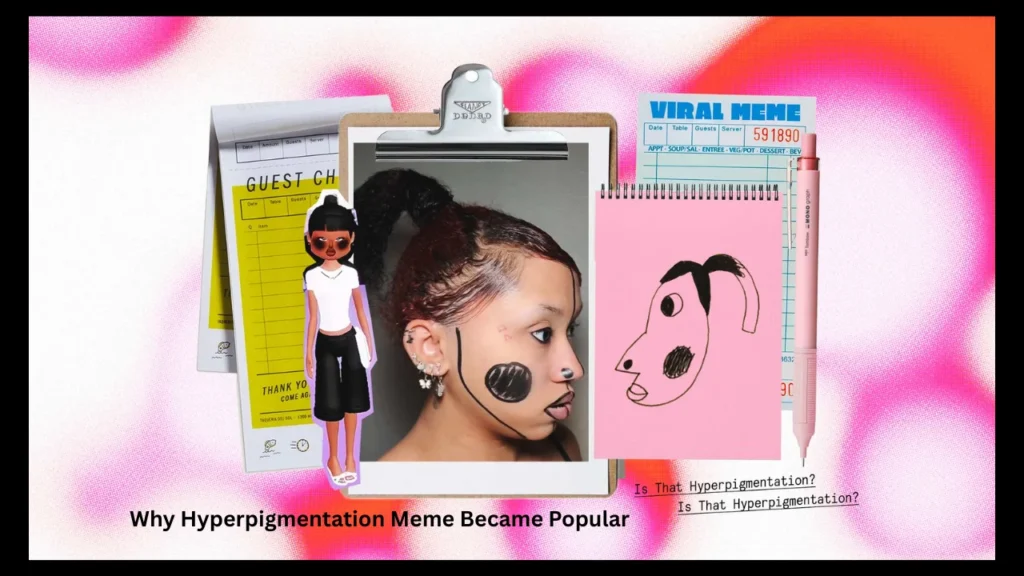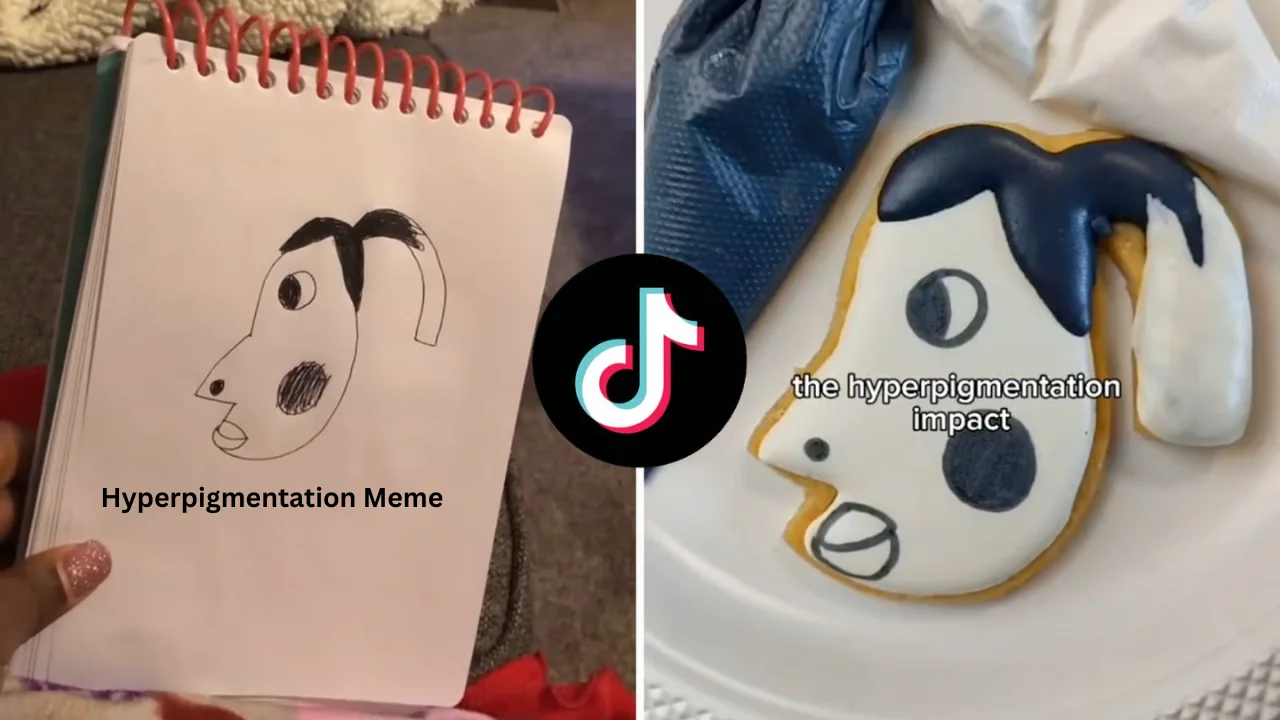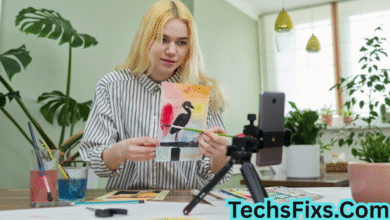The hyperpigmentation meme is an unexpected blend of skincare awareness and online humor. While hyperpigmentation refers to dark patches on the skin caused by excess melanin, memes about it have become a way for people to talk about skin issues without heavy medical jargon. This trend has grown on platforms like Instagram, TikTok, and Reddit, where creators mix skincare facts with relatable jokes.
The humor works as both a coping mechanism and an educational tool. Many people dealing with uneven skin tone find it easier to laugh and share experiences through memes rather than serious discussions. As a result, the meme format has helped normalize skin concerns and reduce stigma.
The Rise of Skincare Humor Online
Before memes became common in the skincare world, discussions about hyperpigmentation were often medical or product-focused. Social media changed that. Influencers, dermatologists, and everyday users began sharing jokes, relatable struggles, and before-and-after images wrapped in meme culture.
The hyperpigmentation meme trend reflects a wider shift: beauty conversations have become more open, inclusive, and playful. It is no longer unusual to see posts that mix dermatology terms with witty captions, making the subject more approachable for younger audiences.
Why Hyperpigmentation Meme Became Popular

Several reasons explain why these memes took off:
- Relatability – Many people across different skin tones experience hyperpigmentation, whether from acne scars, sun exposure, or hormonal changes.
- Educational Humor – Memes can simplify skincare advice, like reminding people to use sunscreen daily.
- Emotional Support – Seeing others share the same struggles helps reduce feelings of isolation.
- Viral Potential – Skincare memes are easy to share, and humor travels faster than long-form guides.
The hyperpigmentation meme has become more than a joke—it is now a form of online community building.
ALSO REAAD: Mastering the Power of Gimkit Host A Comprehensive Guide to Engagement and Education
Common Themes in Hyperpigmentation Meme
When you scroll through social media, you’ll notice that most memes about hyperpigmentation fall into a few categories:
- Before-and-After Humor – Comparing dramatic skincare results to unrelated funny images.
- Product Overload – Jokes about using too many serums and creams with uncertain results.
- Patience Struggles – Memes showing the frustration of waiting months for visible skin improvement.
- Sunscreen Reminders – Playful warnings about skipping SPF and regretting it later.
These categories not only entertain but also subtly remind viewers about realistic expectations and proper skincare habits.
ALSO READ: Charity Nye A Life of Privacy Behind a Famous Name
The Positive Impact of Hyperpigmentation Meme
Far from being just entertainment, the hyperpigmentation meme has benefits:
- Spreading Awareness – Many people learn the term “hyperpigmentation” through memes before researching it further.
- Reducing Shame – Humor helps people talk openly about skin issues that might otherwise feel embarrassing.
- Encouraging Consistency – Memes can serve as reminders to stick with a skincare routine.
- Creating Dialogue – They open the door to deeper discussions about skin health and treatment options.
By making light of a common concern, these memes make skincare more relatable and accessible.
The Potential Downsides
While mostly positive, there are some drawbacks to the hyperpigmentation meme trend:
- Oversimplification – Memes sometimes skip important medical context.
- Unrealistic Expectations – Some jokes unintentionally promote quick-fix solutions that don’t exist.
- Misinformation – Incorrect skincare tips can spread quickly if presented humorously.
This means consumers should enjoy the laughs but also do their own research or consult professionals before following any meme-based advice.
How Dermatologists View Hyperpigmentation Memes
Interestingly, many dermatologists appreciate the rise of memes in skincare culture. Some even create their own to debunk myths in a friendly way. They see humor as a gateway to serious conversations about treatment.
However, professionals stress that while the hyperpigmentation meme can spark curiosity, it should not replace proper consultation. The best memes balance entertainment with accurate, evidence-based information.
Cultural Relevance and Inclusivity
One reason hyperpigmentation memes resonate widely is that they cross cultural lines. Hyperpigmentation affects all skin tones, though it may appear more visibly in medium to dark skin. Memes have created a shared language where people from different backgrounds can connect over a common issue.
This inclusivity helps shift the beauty industry’s focus toward diverse skin needs. Many meme creators also highlight the lack of representation in skincare marketing, using humor to push for change.
Examples of Hyperpigmentation Meme Humor
While each meme is unique, here are a few popular formats (described, not shown):
- Expectation vs. Reality – A flawless celebrity skin photo labeled “2 weeks of vitamin C serum” next to a much less dramatic real-life result.
- SPF Reminders – A sun emoji chasing a person with “me without sunscreen” written on it.
- Slow Progress – A skeleton waiting in front of a mirror captioned “waiting for my dark spots to fade.”
These formats work because they combine visual humor with relatable situations.
Memes as a Form of Skincare Marketing
Brands have noticed the popularity of the hyperpigmentation meme and use it to connect with audiences. By sharing memes, they position themselves as relatable and in touch with everyday struggles.
The best marketing memes:
- Avoid making fun of customers.
- Provide real skincare tips alongside jokes.
- Use brand personality without losing authenticity.
This strategy works because it blends humor with education, creating trust and brand loyalty.
Psychological Role of Humor in Skin Confidence
Skin concerns can affect self-esteem. The hyperpigmentation meme helps people cope by reframing the issue as something manageable. Humor can:
- Reduce anxiety around appearance.
- Create a sense of belonging in online communities.
- Encourage self-care without guilt.
In essence, memes transform a potentially sensitive topic into a shared inside joke, making it easier to talk about openly.
How to Make Your Own Hyperpigmentation Memes
If you want to join the conversation, you can create your own memes using these tips:
- Know Your Audience – Focus on people who understand skincare struggles.
- Stay Relatable – Use situations that most skincare enthusiasts have experienced.
- Avoid Shaming – Keep humor light and inclusive.
- Add Value – Include a skincare tip or encouraging message.
By doing this, your memes can entertain while spreading useful information.
The Future of Hyperpigmentation Memes
Memes are unlikely to disappear from skincare culture anytime soon. As more people seek relatable and digestible content, the hyperpigmentation meme will continue evolving. Future trends might include:
- More dermatologist-created memes for credibility.
- Interactive meme formats on platforms like TikTok.
- Educational campaigns disguised as humor.
This blend of fun and function ensures memes remain part of the online skincare conversation.
Frequently Asked Questions
What is a hyperpigmentation meme?
A hyperpigmentation meme is an online joke or relatable post about skin discoloration, often mixing humor with skincare tips or awareness.
Why are hyperpigmentation memes so popular?
They’re popular because they combine humor, education, and relatability, helping people feel less alone in their skincare journey.
Can hyperpigmentation memes provide real skincare advice?
Some memes include helpful tips, but they should never replace professional advice from a dermatologist or skincare expert.
Conclusion
The hyperpigmentation meme has moved beyond internet humor into a space where it shapes awareness, builds community, and encourages better skincare habits. While they shouldn’t replace expert advice, these memes provide an accessible entry point for people to learn about skin health. By balancing entertainment with accuracy, meme culture has made discussions about hyperpigmentation more inclusive, relatable, and less intimidating.

